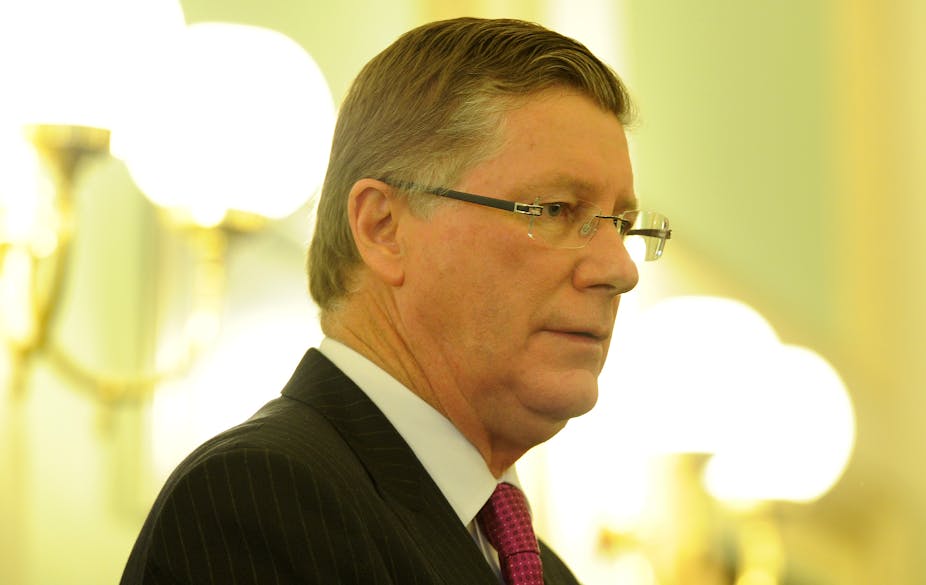Speaker Ken Smith has lost control of the Victorian parliament and the legislative agenda of premier Denis Napthine has ground to a halt. In an extraordinary move, Smith decided to shut down the Legislative Assembly until the next sitting day on November 26. Rarely has Victoria’s parliament been overcome by such absurdity.
Central to the matter is that Smith has obviously lost the confidence of a majority of MPs and therefore cannot enforce the rules of the parliament. Opposition MPs can and will now behave in a deliberately inflammatory and antagonistic manner during question time to test the standing of the Speaker.
But just how did the Victorian parliament descend into complete chaos?
As has come to be expected in crises in Victorian politics, independent Frankston MP Geoff Shaw has his fingerprints all over this current situation. Never far from controversy, the “rogue” MP - who resigned from the Liberal Party in March but whose vote is still required by the government given their one-vote majority - shocked parliament on Tuesday by announcing he had lost confidence in the Speaker.
It appears that the tension between Shaw and Smith is more personal than political and that Shaw is not moving against the Liberal-National coalition.
Of course, the opposition Labor Party is taking full advantage of the situation. Opposition leader Daniel Andrews contends that “the government is out of control” and that Smith is an “embarrassment”.
For some time, the Labor Party has been furious at the willingness of Smith to impose sanctions against opposition members. Andrews, who was kicked out of parliament by the Speaker for three days earlier this year, clearly has Smith in his sights and will attempt to force his resignation.
A defiant Smith has in turn accused the Labor Party of bringing the parliament into disrepute and has declared that he will not resign the Speakership. His overriding rationale is that he was elected to the Speakership and therefore has the right to continue.
Unsurprisingly, Napthine has blamed the opposition for orchestrating the standoff and sensationally remarked that Labor Party has “hijacked democracy”. Somewhat optimistically, he suggested that the parliament will resolve the matter and “get on with the job”. But Napthine has refused to be drawn on how the impasse will be resolved.
Napthine has been placed in a precarious position and is presented with a number of politically damaging options. He could act upon the desires of Shaw and quietly ask Smith to resign and move to the backbench. Yet this would be spun by the Labor Party as an embarrassing capitulation to Shaw, who is soon to face charges of misusing his parliamentary vehicle.
In addition, Smith may resist any attempt at a putsch and threaten to quit the party or parliament, and thus create an even larger problem.

If Napthine continues to support Smith then the Victorian parliament could further deteriorate into complete farce. Presented with an unworkable parliament, Smith may elect to adjourn proceedings indefinitely.
It is highly unlikely that the Napthine government would choose a potential outcome that creates further chaos. Labor MPs and Shaw, given their legitimate concerns regarding the management of parliament by Smith, will not relent in their tactics and any opinion to the contrary is wishful thinking.
However, the current predicament could have been entirely avoided had scenarios such as these been more closely considered at the time of the constitutional amendment in 2003. It remains perplexing that the Victorian Legislative Assembly has an even number of MPs.
A commonsense solution to matters such as the one discussed here would be to adjust the number of seats in the Assembly to an odd number (as is the case in every other state lower house in Australia). Nonetheless, the only mechanism through which the numbers of the Victorian Legislative Assembly can be adjusted is via a referendum.
Something has to budge, though. It appears that it will likely be Smith.

